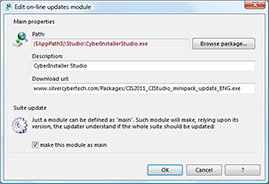![]() CyberInstaller Studio - 58. Add/Edit online updates module
CyberInstaller Studio - 58. Add/Edit online updates module
By clicking the "Add" button in step 20 - "On-line updates"
a window will be displayed. Using this you can add a new module for
online updates the end user can use to update the installed application
the module refers to. Clicking on the "Edit"
button in the same step, this window will open up but with the values
of the selected module already filled-in, in order to be easily edited.
The
modules are the applications, by default all the executables found in
the package, but a module can also refers to any other file type.
For each module you will need to specify a description that identifies
it, the location within the package, a url from which the updater
download it (the url should point to an installation package that
contains the updated module) and if the module in question is the main
one (to decide whether to download and install a suite-package that
includes all modules, or each module individually).
![]() CyberInstaller Studio - 58.1. Using the window - "General Properties"
CyberInstaller Studio - 58.1. Using the window - "General Properties"
 Path [field] - Example: "|$AppPath$|\Studio\CyberInstallerStudio.exe"
Path [field] - Example: "|$AppPath$|\Studio\CyberInstallerStudio.exe"
![]() WARNING: it
is important not to forget to manually upload the installation package
containing the updated module to the address given in the "Download
URL" field, if not at the moment of the actual updating, the updater
would fail to download the installation package and the update would
fail. These upload operations to your server (via FTP) are not operated
by CyberInstaller Studio, so you must use an FTP software of third parties, such as the free FileZilla.
WARNING: it
is important not to forget to manually upload the installation package
containing the updated module to the address given in the "Download
URL" field, if not at the moment of the actual updating, the updater
would fail to download the installation package and the update would
fail. These upload operations to your server (via FTP) are not operated
by CyberInstaller Studio, so you must use an FTP software of third parties, such as the free FileZilla.
![]() CyberInstaller Studio - 58.2. Using the window - "Suite update"
CyberInstaller Studio - 58.2. Using the window - "Suite update"
Make this module as main [checkbox] [Default = no]
![]() WARNING: CyberUpdater
will decide whether to download the package in "full" or "upgrade"
version on the basis of the module marked as "main" (value "yes" in the
"Suite?" column). If there are no main modules, "full" or
"upgrade" packages will never be downloaded.
WARNING: CyberUpdater
will decide whether to download the package in "full" or "upgrade"
version on the basis of the module marked as "main" (value "yes" in the
"Suite?" column). If there are no main modules, "full" or
"upgrade" packages will never be downloaded.
The module version number is usually as follow: major.minor.release.build
If a module is marked as "main" ("yes" value in "Suite?" column), the updater will behave as follows:
- local version number equal to or greater than the remote version: does nothing;
- local version number on the left (major)
less than the corresponding remote: upgrade the entire suite as "full"
(a separate installation package containing all the modules of the
suite, to be prepared and marked as "update"), may require an update of
the license;
- central number of local version (minor)
less than the corresponding remote: upgrade the entire suite as
"upgrade" (a separate installation package containing all the modules
of the suite, to be prepared and marked as "update"), does not require
license updates;
- local version numbers on the right (release and build) smaller than the corresponding remote: upgrade single module (installation of the package of current module)
![]() CyberInstaller Studio - 58.3. Examples
CyberInstaller Studio - 58.3. Examples
Ex. 1:
you want to add a module for the application "CyberEasyManager", and
you want to set it as "main" so that the updater will decide whether or
not to
download the complete suite if available:
Path = "|$AppPath$|\CyberEasyManager"
Description = "CyberEasyManager"
Download url = "www.silvercybertech.com/Packages/Apps/CEM/CyberEasyManager_minipack.exe"
Main = yes
Ex. 2: you want to add a second module for the "Database integrity fix tool" application:
Path = "|$AppPath$|\Tools\DBCHKFIX.exe"
Description = "Database integrity fix tool"
Download url = "www.silvercybertech.com/Packages/Apps/CEM/DBChkFix_minipack.exe"
Main = no
Ex. 3: you want to add a module related to CyberUpdater (automatically added):
Path = "|$AppPath$|\Updater\CyberUpdater_ENG.exe"
Description = "CyberUpdater" [unchangable]
Download url = "www.silvercybertech.com/Packages/CIS2011_Updater_minipack_update_ENG.exe"
Main = no
![]() See also...
See also...